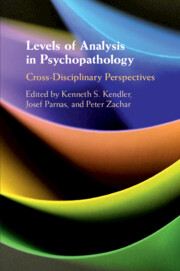Book contents
- Levels of Analysis in Psychopathology
- Advance Praise for Levels of Analysis in Psychopathology
- Levels of Analysis in Psychopathology
- Copyright page
- Contents
- Figures
- Tables
- Contributors
- Preface
- General Introduction
- Part I Neuroscience, Mechanisms, and RDoC
- Part II Phenomenology, Biological Psychology, and the Mind–Body Problem
- Section 4
- Section 5
- 13 Introduction
- 14 Can Psychiatry Dispense with the Appeal to Mental Causation?
- 15 Folk Psychology and Jaspers’ Empathic Understanding: A Conceptual Exercise?
- Section 6
- Section 7
- Part III Taxonomy, Integration, and Multiple Levels of Explanation
- Index
- References
15 - Folk Psychology and Jaspers’ Empathic Understanding: A Conceptual Exercise?
from Section 5
Published online by Cambridge University Press: 02 April 2020
- Levels of Analysis in Psychopathology
- Advance Praise for Levels of Analysis in Psychopathology
- Levels of Analysis in Psychopathology
- Copyright page
- Contents
- Figures
- Tables
- Contributors
- Preface
- General Introduction
- Part I Neuroscience, Mechanisms, and RDoC
- Part II Phenomenology, Biological Psychology, and the Mind–Body Problem
- Section 4
- Section 5
- 13 Introduction
- 14 Can Psychiatry Dispense with the Appeal to Mental Causation?
- 15 Folk Psychology and Jaspers’ Empathic Understanding: A Conceptual Exercise?
- Section 6
- Section 7
- Part III Taxonomy, Integration, and Multiple Levels of Explanation
- Index
- References
Summary
Peter Zachar argues that one of the challenges to accurate empathic understanding that Campbell identifies, that these imaginative reconstructions might be fictional just-so stories, is not resolved by one of his proposed solutions – adopting R. G. Collingwood’s critical approach to writing history by reconstructing the thoughts and motivations of important historical figures. In contrast to the notion of reconstructing another’s internal thought processes, Zachar claims that most of the information we use to understand others is based on third-person information, which is largely how psychotherapists are taught to understand others. He compares this process to Karl Popper’s notion of critical rationalism.
- Type
- Chapter
- Information
- Levels of Analysis in PsychopathologyCross-Disciplinary Perspectives, pp. 194 - 200Publisher: Cambridge University PressPrint publication year: 2020

